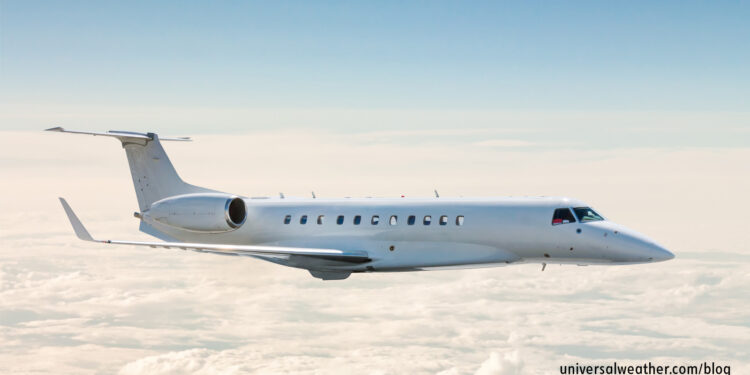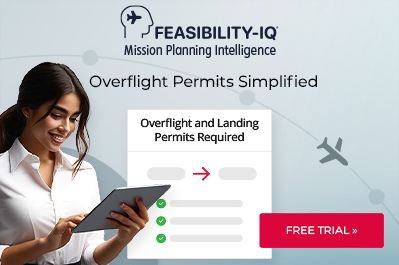Considerations When Operating to Caracas

This is a post by author Walter Lindo. Walter is Managing Director for Universal Aviation Venezuela – Caracas. Walter is an expert on business aircraft operations in Venezuela and can be contacted at walterlindo@universalaviation.aero.
It’s become easier to operate short trips to Venezuela lately now that permits, for most operations, are no longer required if certain requirements are met. Business aircraft operators can look forward to high standards of aircraft support services at Caracas (SVMI). Quick turn tech stops also work out well at this location.
The following is an overview of what you need to know:
1. Permits are no longer required for short visits to Venezuela
New regulations allow operators to spend up to 72 hours on the ground in Venezuela – up to twice per month – by only notifying the Civil Aviation Authority three working days prior to arrival. Be aware that all outstanding navigation (nav) fees must be settled prior to your scheduled operation to ensure a smooth trip to this location. If you’re in Venezuela without a permit, and the aircraft must remain longer than 72 hours – as a result of a technical issue, for example – it may take up to seven days to obtain a permit to depart.
2. Customs may not be cleared onboard
Customs cannot be cleared onboard, unless it’s a diplomatic flight. Crew and passengers will clear Customs, Immigration, and Quarantine (CIQ) through the main terminal at SVMI, and all onboard must present passports individually. If visas are required, it’s best to have them prior to arrival. Some nationalities can obtain visas on arrival, but check this in advance with your 3rd-party provider. CIQ clearance is usually about 15 minutes, but the process can take up to 45 minutes during high-traffic periods. During the clearance process, your aircraft will be searched by national security, and, for takeoff, national security will escort passengers to the aircraft. There are provisions for declaring weapons and having them kept by national security at SVMI. Undeclared weapons may result in confiscation, fines, and detention of the weapon owner(s). No customs clearance is required for tech stops at SVMI so long as crew and passengers do not enter the country, which means that they may not leave the airport.
3. Security presence is visible at SVMI
On landing, you’ll observe national security personnel with weapons. High-security measures at this location require crew and passengers to go through four security checkpoints in order to get back to the aircraft. On landing, you’ll need 22 copies of the general declaration (gen dec). These will be distributed to various departments, including airport security, policia national, secret police, customs, immigration, sanitation control, etc. Your handler will take care of gen dec distributions.
Update 3/19/2014 by Sabrina Lindo:
As of March 19, 2014, Caracas (SVMI) airport authorities have advised a new regulation for arriving aircraft. Specifically, upon arrival all aircraft must wait with the door closed until the ground handler and the National Guard official arrive to their location so the aircraft can be inspected. Until their arrival, operators can’t open the door, as alternatively the ground handler will be sanctioned.
Please note that there will be times when the National Guard official will be delayed, as he/she will be inspecting other aircraft. This can’t be arranged in advance, as it’s on a first-come-first-serve basis.
Note that the National Guard official will inspect the aircraft prior to the passengers’ disembarkation (on arrival) and will also inspect the aircraft prior to departure.
4. Aircraft parking spots can be very tight
SVMI can be a busy and congested location at certain times, and you may be parked in a very tight manner close to other aircraft. There’s a close-in General Aviation (GA) ramp at SVMI that accommodates business aircraft up to the size of a Bombardier Challenger. If you’re operating anything the size of a Gulfstream II or larger, however, you’ll be parked in one of three remote parking areas, and this may be up to five kilometers from the terminal. Your ground handler will arrange all on-airport transportation. While airport slots are not required for SVMI, your ground handler must request aircraft parking with airport authorities in advance of your arrival. Towbars are not required at SVMI.
5. Know airport considerations
SVMI is a 24-hour airport with 24/7 CIQ availability, few local weather issues, and no noise restrictions. For late arrivals, please notify your ground handler so that customs can be advised. SVMI closes for takeoff and landings whenever the president of Venezuela is arriving or departing. No notice to airmen (NOTAM) is issued for presidential operations, and aircraft may be held on the ground for up to two hours. Any aircraft arriving from the Dominican Republic require a special form to be filled out, and this will be checked by sanitation control for dengue fever. Best alternate airports for SVMI include Margarita Island (SVMG), Aruba (TNCA) and Curacao (TNCC).
6. Private non-revenue and charter operations are treated in a similar manner
Venezuela considers both private non-revenue and charter (non-scheduled commercial) to be business flights and treats them the same. There is no requirement for permits to operate either private non-revenue or charter to Venezuela for stays of up to 72 hours. While cabotage regulations exist in Venezuela, they’re not imposed. Be aware that “demo” flights require a permit for all operations into this country. Air ambulance operations should submit permit notification 72 hours in advance, but short-notice permits are often possible – with 24 hours’ notification – for air ambulance operations.
7. Be sure that your navigation fee payments are up to date
All navigation fees due to Venezuela must be paid, and up to date, before you leave the country. It’s best to have your ground handler provide Instituto Nacional de Aeronautica Civil (INAC) with proof of payment, in advance, as any unpaid fees will cause operational delays. INAC does not send out invoices for nav fees due, and it’s the operator’s responsibility to self-record and self-report charges due. Best practice is to seek assistance from your 3rd-party provider to determine if fees are outstanding. If fees are outstanding, it can take seven days to settle them, and this may cause a significant operational delay.
8. Always notify service requirements prior to arrival
Notify your ground handler, prior to arrival, of all service requirements. Expect delays of 15 minutes and up to two hours if service requirements – including lav/water, fuel, etc. – are not notified until after landing. Priority goes to operators who’ve made service requests in advance.
9. Expect delays during peak hours of operation
Peak hours at SVMI are normally 0700-0900 and 1600-2000 local. GA aircraft may operate during these times, but you’ll experience delays for arrival/departure and CIQ clearance. During holiday periods, anticipate departure delays of up to one hour. If you do experience a delay, your ground handler will assist with keeping your flight plan on file. Air Traffic Control will inform you of airport delays and will not normally cancel flight plans.
10. Be aware of off-airport considerations
When leaving the airport, ensure that you have vetted secure transportation arranged. Don’t take local taxis unless it’s a secure taxi that the ground handler or your hotel recommends. For security reasons, crew should avoid renting vehicles. With no traffic delays, the drive from SVMI to town (32 kilometers) takes 30-40 minutes. In high-traffic situations, however, it can require two to four hours to drive between the airport and the city. Be aware of personal security while staying in Caracas. Currency controls exist in Venezuela, and you may only exchange currency at official exchange offices. Major credit cards are accepted for shopping, but you’ll need your passport for identification, and credit card charges must be over 100USD.
Conclusion
Always use an experienced 3rd-party provider and ground handler when operating to Venezuela and be sure to confirm pre-trip that you have no outstanding nav fees due. Always let your ground handler know what services are needed in advance, in order to avoid any delays on the ground. Last, ensure that you are aware of the local security situation.
Questions?
If you have any questions about this article or operations to Venezuela, contact me at walterlindo@universalaviation.aero.




